Strategic Thought Transformation - The IIPM Think Tank
Strategic Thought Transformation - The IIPM Think Tank
Strategic Thought Transformation - The IIPM Think Tank
Create successful ePaper yourself
Turn your PDF publications into a flip-book with our unique Google optimized e-Paper software.
E D I T O R I A L<br />
Competing to death!<br />
W<br />
ell, that’s the heading for<br />
one of the benchmark research<br />
papers written in this issue<br />
of <strong>Strategic</strong> Innovators. As<br />
quoted in even other papers in<br />
this journal, the world is viewing<br />
a dramatic shift in competitive<br />
dynamics from straightforward<br />
competition to rampant co-opetition!<br />
<strong>The</strong> term co-opetition refers<br />
to a situation where diehard<br />
competitors start collaborating, legally of<br />
course, to maximise shareholders’ value, profits,<br />
revenues etc, and to minimise consequent<br />
costs and expenses by optimal utilization of<br />
joint operations, products, services et al.<br />
One of the most compelling reasons for<br />
competitors to turn co-opetitors is the focus<br />
on maximizing returns from core competencies.<br />
When two competitors realize that they<br />
are stuck in a “prisoner’s dilemma” situation,<br />
where competing against each other actually<br />
ends up giving them lesser returns, a logical<br />
methodology of operating becomes co-opetition.<br />
Examples are in abundance. Instead of<br />
competing, Disney and Pixar Animation went<br />
the co-opetition way, where Pixar provided<br />
the graphics content for movies like Finding<br />
Nemo, Toy Story, Monsters Inc, <strong>The</strong> Incredibles,<br />
Bug’s Life etc, while Disney went ahead<br />
and distributed these hugely successful films<br />
all over the globe. Or where companies like<br />
Hindustan Motors and Mahindra & Mahindra<br />
have supplied engines and other auto components<br />
to companies like General Motors<br />
and Ford (and now to Renault too). Where<br />
HLL still distributes the Dalda brand – that it<br />
sold off to top competitor Bunge – through its<br />
own channels. Where Honda of Japan would<br />
continue selling various automobiles through<br />
its joint venture with the Hero group in India,<br />
and at the same time, continue selling scooters<br />
through another arm unrelated to Hero, and<br />
generators through another.<br />
Co-opetition, and not straightforward competition,<br />
is becoming the rule, especially in<br />
industries that have typically high competitive<br />
pressures, and – if one can mention<br />
– intelligent competitors.<br />
Perhaps the biggest, the most<br />
successful, and one of the oldest<br />
of all co-opetition examples<br />
can be found in OPEC, a cartel<br />
legally formed by oil producing<br />
countries ostensibly to ensure<br />
that there is no over supply of<br />
oil, as that would – again ostensibly<br />
– result in crashing of<br />
prices, consequently placing all oil producing<br />
countries in losses. Though the OPEC was<br />
initially unsuccessful, with time, countries<br />
accepted quotas for production, which contributed<br />
to the huge success of OPEC and its<br />
member countries; a fact that can be seen<br />
from the high and rising per capita incomes<br />
of the OPEC nations.<br />
Truly so, infrastructure industries are perfect<br />
spaces for co-opetition to flourish. Steel<br />
is one such example. In recent news has been<br />
the ongoing hostile takeover bid by Mittal<br />
Steel (the world’s largest steel producer) for<br />
Arcelor (the world’s largest steel corporation<br />
in terms of revenues and profits). Whether<br />
the takeover bid goes through or not completely<br />
depends on the European Commission’s<br />
approval; especially given the fact that<br />
the CEO of Arcelor, Guy Dolle, and the French<br />
& Luxembourg governments, have illogically<br />
shouted their throats hoarse about national<br />
security (and employment) being at stake! In<br />
the end, Mittal might have to churn out a price<br />
that is higher than the actual worth of Arcelor,<br />
just to cash in on the distribution channels,<br />
and high production quality of Arcelor steel.<br />
Could the answer to Mittal optimising his<br />
company’s returns have been in co-opetition<br />
with Arcelor Well, one just might actually<br />
see that happening in this takeover bid, if<br />
Mittal finally refuses to pay the higher price,<br />
or if the European Commission bends to fears<br />
of national security being compromised! As<br />
I mentioned, competing<br />
to death never was recommended;<br />
or was it<br />
An <strong>IIPM</strong> Intelligence Unit Publication STRATEGIC INNOVATORS 5


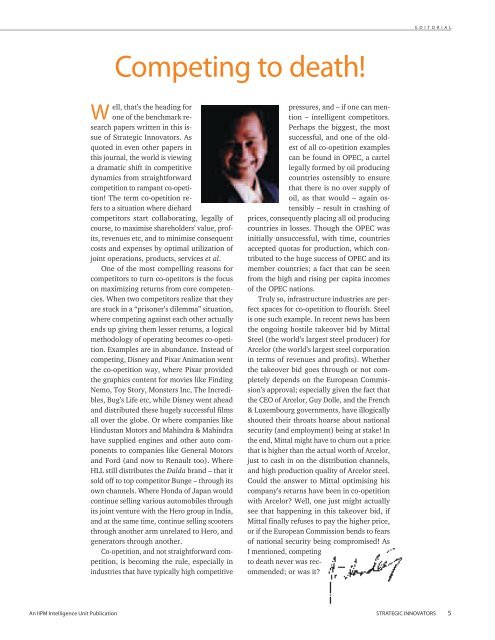
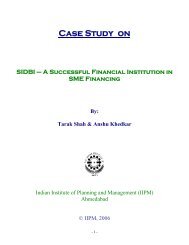
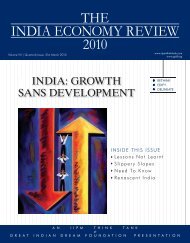
![[Feb 2008, Volume V Annual Issue] Pdf File size - The IIPM Think Tank](https://img.yumpu.com/43961117/1/190x245/feb-2008-volume-v-annual-issue-pdf-file-size-the-iipm-think-tank.jpg?quality=85)
![[June 2008, Volume V Quarterly Issue] Pdf File size - The IIPM Think ...](https://img.yumpu.com/41693247/1/190x245/june-2008-volume-v-quarterly-issue-pdf-file-size-the-iipm-think-.jpg?quality=85)

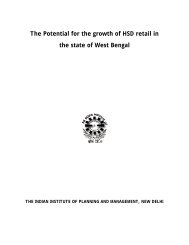
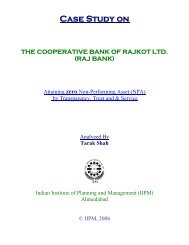

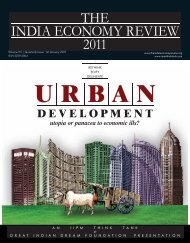
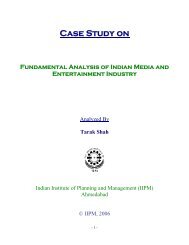
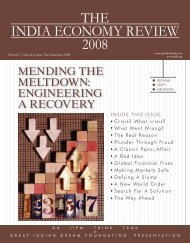
![[Dec 2007, Volume 4 Quarterly Issue] Pdf File size - The IIPM Think ...](https://img.yumpu.com/29766298/1/190x245/dec-2007-volume-4-quarterly-issue-pdf-file-size-the-iipm-think-.jpg?quality=85)
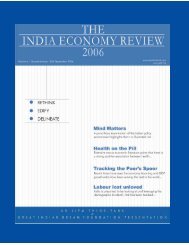
![[Volume VI | Quarterly Issue: 31st May 2009] Pdf File size](https://img.yumpu.com/27796051/1/190x245/volume-vi-quarterly-issue-31st-may-2009-pdf-file-size.jpg?quality=85)